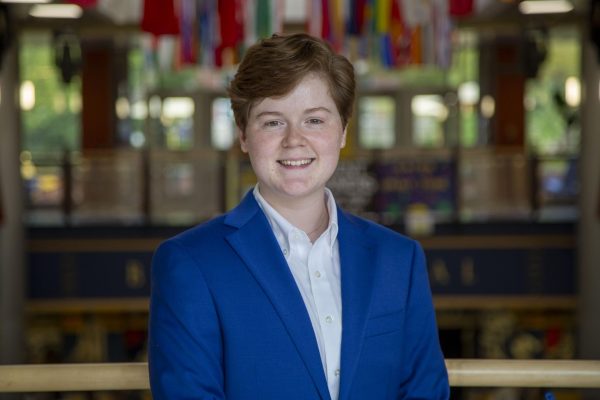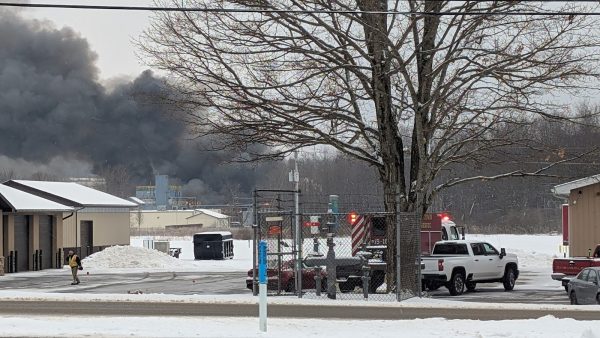Envisioning land acknowledgement
Professors, Deans host conversation in GFC
Students and faculty gathered in Grounds for Change for the fourth installment of the DEEPly Sustainable series on Friday, Nov. 11. Hosted during Native American Heritage Month, this section sought to teach attendees about the ongoing development of an “Indigenous Land Acknowledgement” that Allegheny may adopt in the future. Beyond educating attendees about the existence of the land acknowledgement, the event encouraged conversations about the subject and answered questions.
The informal, interactive conversation was led by Director of Sustainability Kelly Boulton, ’02; Visiting Assistant Professor of Environmental Science and Sustainability Delia Byrnes; Assistant Professor of Environmental Science and Sustainability Jesse Swann-Quinn; and Dean of Diversity, Equity, and Inclusion and Assistant Professor of Community and Justice Studies Heather Moore Roberson.
“A land acknowledgement is a formal statement recognizing Indigenous peoples as the original and enduring stewards of the land now known as the United States of America,” read a document displayed during the event on a large screen.
“It’s really about raising critical consciousness about histories that are often erased,” Byrnes said after the event. “I think opening up the conversation and normalizing the conversation about the fact that all of the U.S. has stolen Indigenous land is really important for raising awareness and empowering students to think about what political movements they want to get behind, what kind of actions they want to take themselves.”
The document displayed at the event contained three drafted versions of the Land Acknowledgement the college could adopt that varied in length, with the longest being for events, the middle-length for posters and programs and the shortest for email signatures.
“While at Allegheny College, I live and work on the ancestral homelands of the Erielhonan, Haudenosaunee, and Lenni Lenape peoples,” read the email signature.
Swann-Quinn said that people should not alter the language of the statements in order to preserve the integrity of their research. Still, if adopted, the Land Acknowledgement would function as a “living document” that evolves as new perspectives enter the conversation.
The idea for the Allegheny College Land Acknowledgement originated in an ENVSC 210: Environmental Research Methods class co-taught by Byrnes and Swann-Quinn in the fall of 2020. COVID-19 prevented the class from pursuing a normal research project, so they chose to explore local Indigenous history. According to Byrnes, she is one of only two people with a humanities background in the Environmental Science and Sustainability department. She also has a history in Indigenous storytelling. This, coupled with Swann-Quinn’s interest in the political struggle of land ownership, led to the class researching and compiling information for the future development of a land acknowledgement.
“One of the things that really let us know as we were working on this class that we were on to something that needed to be explored more was that it was really hard to find information about Indigenous history in this area,” Byrnes said during an interview. “And that’s a problem because the entire U.S. is stolen Indigenous land and we need to be aware of those histories.”
Before connecting with Brynes and Swann-Quinn, Boulton had already started working on a land acknowledgement for Allegheny, approaching it from the perspective of exploring how sustainability and Indigenous struggles are interconnected.
“In (climate justice work) there is a lot of conversation going on right now about how we should be thinking about privilege, identity and structural racism — issues that are wrapped up in our institutions — and how we need to really acknowledge them and break them down,” Boulton said during the event. “Structural racism is not about what you do, but about what you don’t do. We are not necessarily an overtly racist institution, but we are an institution that’s 200-years-old. The time of the founding of our college brushes up really closely against Indigenous land stewardship in this area. We’re thinking about (the land acknowledgement) from the framework of how it overlaps with the environmental issues we have now, which in my mind is very much based on an extraction (of land, labor and resources) mindset.”
Assistant Professor of German Julia Ludewig asked the presenters what they knew about the conditions under which settlers forced Indigenous people off the land currently occupied by the college. Boulton explained that there is not much existing information concerning the topic, but that she knows there was a series of treaties between settlers and leaders of the regional tribes that were illegitimate due to a lack of understanding from the settlers about the governing structures of Indigenous tribes. Ludewig suggested that a history student or a paid assistant researcher could be tasked with learning more about the topic in the future. Boulton said she liked the suggestion.
During the event, attendees discussed whether the Land Acknowledgement was purely a performative act.
“One of the things that was really important to (Swann-Quinn) and me was thinking about the land acknowledgement not as a one-and-done or performative statement, but thinking about it as an ongoing project and an entryway into building meaningful relationships with Indigenous neighbors (and) having dialogues as a community,” Byrnes explained to the audience.
The presenters envision a future working group composed of students and faculty who would contribute their voices and perspectives to the development of the Land Acknowledgement. Assistant Professor of Art History and Director of Allegheny Art Galleries Paula Burleigh added that large-scale changes must start by taking a first step.
“There is something really powerful about taking words that might not be a part of our everyday lexicon and reinserting them to cultivate that normalization, like the way we do with pronouns,” Burleigh said. “Even though it seems like a really small gesture, I think it’s really important.”
The Land Acknowledgement is still in the development stage. The presenters hoped that the DEEPly Sustainable event would be the start of many more open conversations with the broader campus community.
“What we don’t want to happen is that there’s this Land Acknowledgement that’s floating in existence and no one knows about it and no one has been a part (of) or privy to conversations about the utility and the meaningful value of a land acknowledgement until it comes out and is on the website,” Roberson said.
According to Roberson, the Land Acknowledgement may have already gone through some of the approval process before she became the Dean of Diversity, Equity, and Inclusion. However, because she was not present for that, she wants to start the approval process with governing bodies on campus over again.
“I’d like these conversations to happen more than once with different governing bodies,” Roberson said. “So even if there’s a possibility that it’s been done before, I’d like to do it again just to make sure we’re doing it our due diligence.”
In the future, the presenters envision the Allegheny College Land Acknowledgement potentially being posted alongside the statement of community, used at events, included in syllabi and programs for events and added to email signatures. The presenters recognized that their work would not end with the adoption of the Land Acknowledgement. Long-term, they hope that Allegheny will be able to foster a future relationship with the nearby Seneca tribe and collaborate with surrounding universities that have Indigenous studies programs to bring more education about Indigenous histories to campus.
“Land acknowledgements are valuable, but empty without doing action-oriented work that supports historically underrepresented groups,” Roberson said. “Land acknowledgements are important and should be adopted into college policies, but if that’s the only work we’re doing, then we have missed out on an opportunity to be more reflective and learn more about the histories of communities of color in this region.”

Anna Westbrook is a junior from the Washington, D.C. area. They are majoring in Environmental Science and Sustainability with a concentration in law &...







